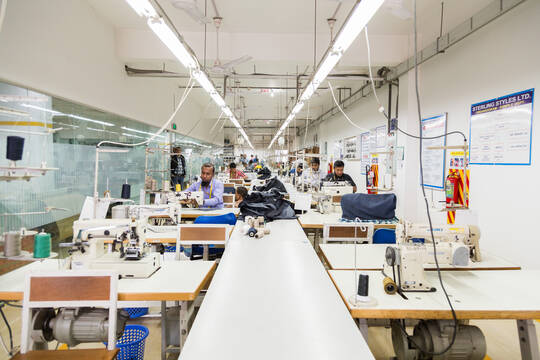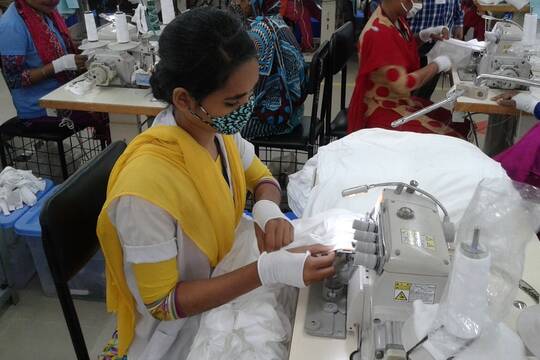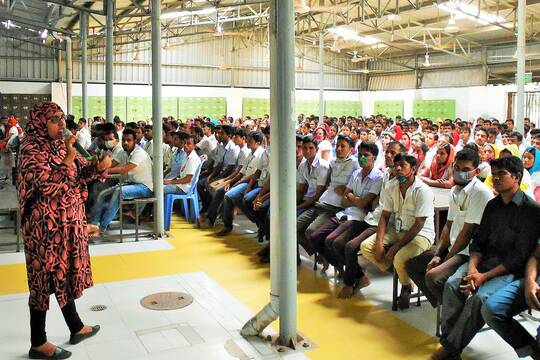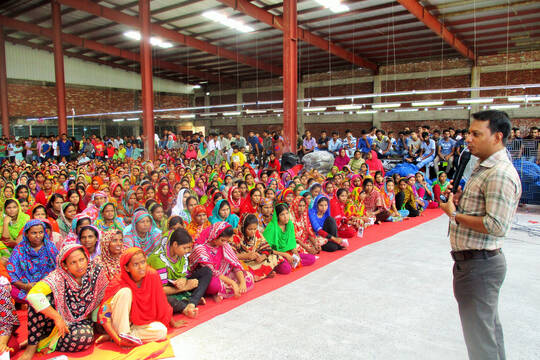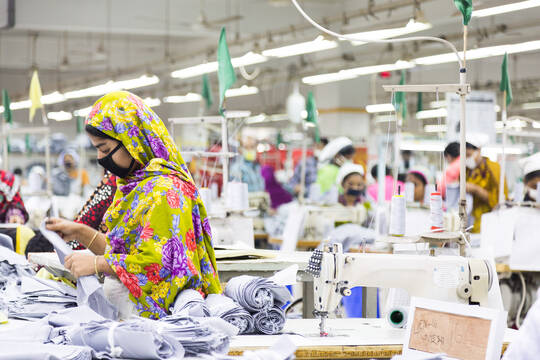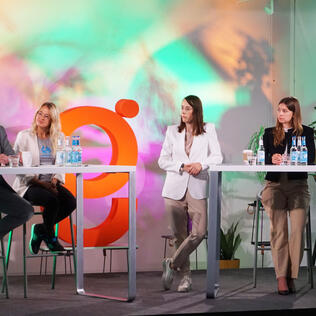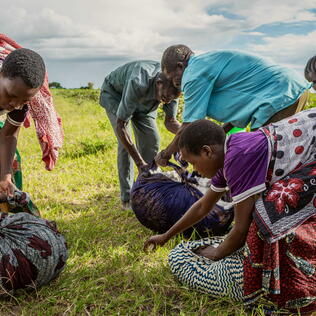Human Rights at the Forefront: How the International Accord Ensures Better Working Conditions

The International Human Rights Day is of great significance as it raises awareness of the fundamental rights and freedoms that belong to every person, regardless of origin, gender, religion, or social status. It serves as a reminder and a call to action to advocate for the protection and promotion of human rights worldwide. In this context, the ”International Accord for Health and Safety”, which has been supported by the Otto Group since its inception, plays a central role. It implements concrete measures to improve working conditions and strengthen human rights in the clothing and textile industry.
Lena, today is International Human Rights Day. Is this a topic at the Otto Group?
Lena: Human rights have always played an important role in our company. For over 30 years, the Otto Group has placed great emphasis on responsibility, which includes respecting human rights. Therefore, a few years ago, we established a process to fulfill our human rights due diligence. The starting point is our Human Rights Declaration, which reflects our values and our stance on human rights, and explains how we concretely implement our duty of care.
But also through our various initiatives and programs, such as the International Accord, we continuously work to protect and strengthen the rights of people in our supply chains. Today serves as a reminder of how important it is to keep these issues in mind and to continue fighting for improvements.
What role does the International Accord play and how do its measures help to protect and strengthen human rights in the garment and textile industry?
Lena: The Accord is a legally binding agreement applicable to textile factories in Bangladesh and Pakistan. It was co-initiated by the Otto Group because, as a business, we see ourselves as part of the solution to societal challenges and want to get involved. Key measures include regular and independent factory inspections, the results of which are published and accessible to all interested parties, training on safety and health standards, as well as an anonymous reporting system for complaints.

The Accord was co-initiated by the Otto Group because, as a business, we see ourselves as part of the solution to societal challenges and want to get involved.
Factories that produce for the Otto Group in Bangladesh or Pakistan must be registered under the Accord and comply with the requirements for labor and safety standards. This includes fundamental human rights such as the right to a safe working environment or the right to breaks and reasonable working hours that do not harm health. Therefore, measures are being implemented that help protect the human rights of workers by making working environments safer and giving employees a voice
How did the International Accord come about, and what events led to its establishment?
Lena: The creation of the agreement was largely driven by a series of tragic events in the garment industry that highlighted inadequate safety standards and poor working conditions in many textile factories. A particularly defining event was the collapse of the Rana Plaza factory in Bangladesh in April 2013, which resulted in the deaths of over 1,100 people and many more injured. This disaster drew global attention to the catastrophic conditions in the garment industry and led to increased pressure on companies to take responsibility and implement measures to improve working conditions. In response to this incident, the International Accord was launched to establish binding standards for health and safety in the garment industry. Since its inception, the Accord has continuously evolved and was expanded to Pakistan in 2023 to improve labor and safety standards there as well.
Can you give specific examples of the changes and improvements that have actually been achieved in the last ten years?
Lena: By carrying out tens of thousands of factory inspections in recent years, safety standards in the workplaces have been significantly improved. More than 1.7 million workers received training in health and safety issues, leading to a significant reduction in occupational accidents and health risks. A concrete example is the introduction of fire safety measures and the inspection of emergency exits, which were previously non-existent in many factories. Furthermore, workers feel empowered and heard through the opportunity to anonymously report deficiencies via the confidential complaint system. This has not only led to a safer working environment but also strengthened workers’ trust in the effectiveness of the Accord.
Workers feel empowered and heard through the opportunity to anonymously report deficiencies via the confidential complaint system.
Overall, we have seen a significant improvement in workplace safety in the garment industry in Bangladesh over the past years. Based on these positive experiences, the Accord and its measures were expanded to Pakistan in 2023 – a significant success for the agreement. The Otto Group was one of the first companies to sign the so-called "Pakistan Accord", which advocates for better labor and safety standards in Pakistan and even covers a larger scope of factories than in Bangladesh.
In view of today's International Human Rights Day: What challenges do you see, and where do you think the biggest hurdles lie in implementation?
Lena: The work of the Accord has undoubtedly had a positive impact on countless factories and their employees. In order to continue to be successful and strengthen human rights in the supply chain, the commitment of all those involved is required, whether they are companies, trade unions, employer associations, or government agencies. For us as a company, it is crucial to create transparency about our production sites and the working conditions in the supply chain. Only if we know exactly where improvements are needed can we take targeted action. Additionally, we must address the challenge of considering cultural differences and local conditions that can influence the implementation of standards. It is important that we not only develop guidelines, but also ensure that they are effectively applied in practice. In conclusion, respecting human rights in the supply chain requires the shared responsibility of all involved parties.
It is important that we not only develop guidelines, but also ensure that they are effectively applied in practice.
Improvements and decent standards can only be achieved through transparency, regular inspections, training, and close collaboration between companies, suppliers, and workers.
What steps is the International Accord planning to take to further improve working conditions?
Lena: In the future, the work of the Accord is intended to be expanded to other countries and regions to establish globally uniform standards. However, the current focus is on Bangladesh and Pakistan to ensure that the Accord’s requirements are implemented effectively and sustainably there. It is crucial that we achieve stable progress in these countries before we expand our initiatives to other regions.
How can consumers help support the enforcement of human rights in the textile industry?
Lena: Conscious purchasing decisions are crucial here. Those who want to make a contribution should look for companies that are demonstrably committed to fairer working conditions and a better ecological footprint, supported by recognized certifications and labels (Fair Trade, FSC, Blue Angel, GOTS, or Cotton Made in Africa). These labels provide reliable guidance to identify products made under more sustainable conditions. While politics sets the framework for better working conditions through laws and regulations, and businesses make a direct contribution by implementing standards, consumers can influence the market through their purchasing decisions and behavior.
Photos: International Accord Secretariat; Otto International; Lena Peleikis



